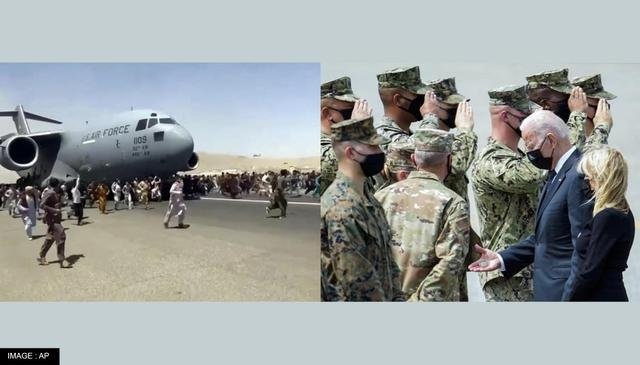Last US soldiers who exited Afghanistan recount mission: ‘We were going to die’
US president Biden justified the tumultuous pullout in a presser, saying that his military commanders unanimously favoured ending the airlift on Aug 31, 2021

As the United States marked one year since the withdrawal of its troops from war-torn Afghanistan that ended America’s longest war post 9/11, the last of the soldiers who exited the territory recounted their experience on the grounds of Hamid Karzai International Airport on August 31, a year ago. During the waning days of the chaotic and frantic final exit of the US military, at least 180 Afghans and 13 US service members from Marine Corp lost lives in an ISIS-K bombing.
Hours ahead of President Joe Biden’s deadline, the US military’s many Afghan allies who were waiting to be rescued from the Taliban’s reprisal for their friendship and loyalty with America, were abandoned. Dozens in the hope of finding a safe refuge in a foreign land witnessed abandonment and colossal failures during the final shutdown of the US Air Force’s C-17 Globemaster’s airlift.
As he formally announced the end of America’s Afghanistan evacuation and the war effort. Gen. Frank McKenzie, head of US Central Command said that whilst the last plane left one minute before midnight from Kabul, a number of American citizens, likely in “the very low hundreds,” were left behind.

In their desperate attempt to escape Kabul, some Afghans clung to the outside of the US Air Force’s transport plane as the crowd surged onto the runway. Many jumped on the US aircraft’s wheels, and wings, or climbed on the body as the transport aircraft struggled to take off from the midst of the harrowing evacuation scenes that caught the world’s attention.
Human body parts were later retrieved in the wheel well of the C-17 Globemaster that departed with the remaining contingent of American troops from Kabul’s airspace, which was shut for flying commercial planes.
The US Air Force’s Air Mobility Command and United States Central Command later ruled that all military crewmembers were “in compliance with applicable rules of engagement.”
There was nowhere to fall back to..’
Recalling the harrowing two weeks of the airlift of tens of thousands of Afghans, Americans and those looking to escape Kabul a year on, William Callen, the retired US Marine gunner said: “It was a mission success or we were going to die..
” In remarks to broadcaster Fox news, the Marine in charge of ‘on-the-ground’ logistics in Afghanistan explained that the US military would be left with no mutually supporting position had they lost the only airfield. “There was nowhere to fall back to,” he maintained. The US Marine admitted that none of the servicemembers was trained for such an exit plan.
US president Biden justified the tumultuous pullout in a presser, saying that his military commanders unanimously favoured ending the airlift. US Secretary of State Blinken was coordinating with the international partners in holding the Taliban to their promise of safe passage for Americans. The airport, apparently, was the only area left under the US-control. It became the only bulwark to America’s 20-year war that claimed more than 2,400 American lives.

“Marine expeditionary units are the only ones that are trained to reinforce embassies and actually do a noncombatant evacuation operation … but no one trained to this scale of what [the evacuation] turned into,” Callen explained, recalling the circumstances in his interview with the broadcaster.
American troops, said the then Marine in charge, were inventing tactics “on the fly, minute by minute, hour by hour.” “If one tactic to get a gate open and start getting people in stopped working, we had to shut the gate down, come up with another tactic.”
Sgt. Nicholas Miller-Assous, deployed in Afghanistan during withdrawal, told his interviewer Bill Hemmer that the only focus for the US forces was “to evacuate as many people as we could,” with troops and officers asking at every step, “Can we take more? Can we just take two more?” Sgt. and Marine Corps veteran Joe Laude of the 2nd Battalion 1st Marines meanwhile agreed that there were “vulnerabilities,” and “potential for hostile engagements” but that, he stressed, did not deter the military from doing the job.

“Throughout my experience over there, it was definitely [focused on] controlling certain individuals. I always had guys by my side that were able to help push them back,” he told FNC.
Sgt. Miller-Assous acknowledged that most of us soldiers “had no experience,” adding that those Afghans who were turned away by the military due to lack of documents or credentials, it was “essentially their death sentence.”
Sandeep Raiza — Content Writer, Website Designer, SEO Strategist, and WordPress Expert AI specialist delivering impactful digital solutions that drive business growth.Combining creative storytelling with technical expertise.
